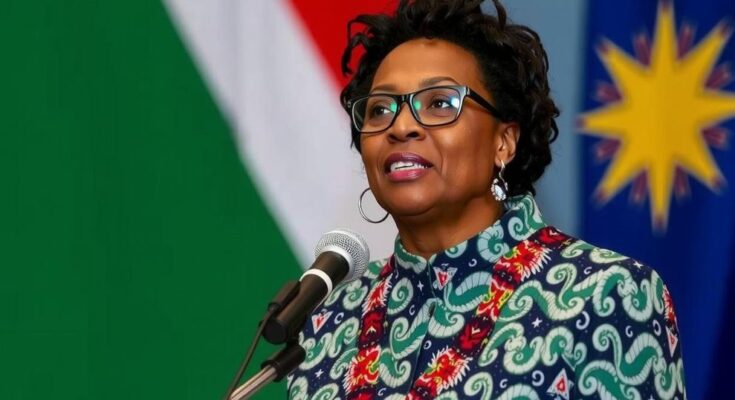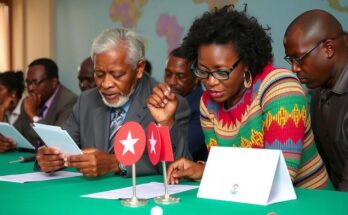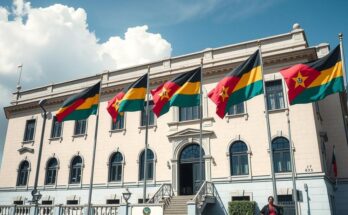Namibia has elected its first female president, Netumbo Nandi-Ndaitwah, who won 57% of the vote in a disputed election. Her victory extends the ruling Swapo party’s 34-year dominance but is criticized by opposition parties over voting irregularities. Nandi-Ndaitwah, a seasoned diplomat, represents a shift in female political representation, amid declining support for the Swapo party.
Namibia has made history by electing its first female president, Netumbo Nandi-Ndaitwah, who emerged victorious in last week’s presidential election. Nandi-Ndaitwah, who is the current vice-president, secured 57% of the votes, surpassing expectations that had predicted a runoff. Her victory not only continues the ruling Swapo party’s dominance, which has been in power for 34 years since Namibia’s independence in 1990, but also signals a shift in female representation in high office.
Following the announcement of the election results on Tuesday, the 72-year-old Nandi-Ndaitwah stated, “The Namibian nation has voted for peace and stability.” She has been a prominent figure in Namibia’s political landscape, having played a significant role in the underground independence movement in the 1970s and subsequently serving in various governmental capacities, including as foreign minister before her ascension to vice-president earlier this year after the death of President Hage Geingob.
However, the election results have not been without controversy. Opposition parties have voiced strong objections, citing technical issues during the voting process, such as shortages of ballot papers, which led to an extended voting period until Saturday. They argue that this extension was illegal and plan to contest the results in court. The main opposition candidate, Panduleni Itula, garnered 25.5% of the votes, a decline from the 29% he received in the 2019 elections.
While Nandi-Ndaitwah exceeded expectations individually, the Swapo party overall received only 53% of the parliamentary vote, a significant decrease from 65% in the last election. Meanwhile, Itula’s new party, the Independent Patriots for Change (IPC), managed to secure 20% of the parliamentary votes. Nandi-Ndaitwah is regarded as a steady diplomat who has remained free from the corruption scandals that have affected other members of her party.
Her election is particularly noteworthy as it bucks a regional trend where incumbent liberation movements face challenges from younger voters, as seen in South Africa, Botswana, and Mozambique, where historical parties have recently experienced declines in their power.
The election of Netumbo Nandi-Ndaitwah marks a significant milestone for Namibia, being the first time the nation has seen a female president. This development follows 34 years of governance by the Swapo party, which has led since the country gained independence from South Africa in 1990. The Swapo party has historically been dominant in Namibian politics, with Nandi-Ndaitwah’s ascendance occurring during a period where other African nations have seen notable unrest and voter dissatisfaction directed at long-standing ruling parties. Historically, the leadership transition in Namibia has been characterized by stable governance; however, recent election complications are raising questions regarding the legitimacy and transparency of democratic processes. Opposition parties in Namibia have alleged irregularities in the presidential election, claiming violations occur when voting procedures are improperly managed. The protests and reactions seen in neighboring southern African nations suggest a growing trend of civil dissatisfaction with established political figures and systems.
In conclusion, Namibia’s election of its first female president, Netumbo Nandi-Ndaitwah, represents a pivotal moment in the country’s political history. While she has achieved historic recognition and a notable electoral victory, the aftermath is marred by allegations of voting irregularities and opposition claims contesting the results. These developments may have significant implications for Namibia’s political landscape and its future governance under Swapo’s continued rule.
Original Source: www.theguardian.com




